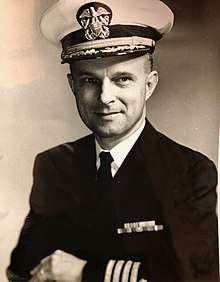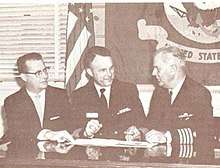Blake Wayne Van Leer
Blake Wayne Van Leer (a.k.a. Blake W. Van Leer) (January 13, 1926 – October 3, 1997) was a prominent United States Navy officer and the son of Georgia Institute of Technology's president Blake R Van Leer and women's rights activist Ella Lillian Wall Van Leer.[1]
Blake Wayne Van Leer | |
|---|---|
 | |
| Commander in the United States Navy | |
| Personal details | |
| Born | January 13, 1926 Berkeley, California |
| Died | October 3, 1997 (aged 71) Arlington, Virginia |
| Resting place | Arlington National Cemetery |
| Children | 3 |
| Relatives | Blake R Van Leer (father) Ella Lillian Wall Van Leer (mother) Maryly Van Leer Peck (sister) |
| Alma mater | Princeton University Duke University North Carolina State University Rensselaer Polytechnic Institute |
| Awards | Moreell Medal Legion of Merit The Peltier Award |
| Military service | |
| Allegiance | |
| Branch/service | |
| Years of service | 1943-1971 |
| Rank | |
| Commands | |
| Battles/wars | World War II Vietnam War |
Early life and education
Van Leer was born in Berkeley, California on the 13th of January in 1926 and one of three children. He was part of a prominent academic and military family; his father was a colonel and university president, his mother a Technologist and principal draftswoman in the Quartermaster general's research department. Van Leer attended Needham B. Broughton High School, studied at North Carolina State University and received a bachelor's degree in Mechanical Engineering from Duke University. He later obtained a Civil Engineering degree from Rensselaer Polytechnic Institute and a master's degree in Civil Engineering from Princeton University.[2]
Military service
In 1943, Van Leer enlisted in the Navy and held several prominent positions in the United States Navy. He quickly rose to the rank of a Lieutenant Commander and later a Commander of the construction Battalion known as the Seabees. As a commander, Van Leer led numerous engineering projects for the Navy during the Vietnam War and was later promoted to Captain.[3] in 1966 he led the SeaBee $100 million project for Military development and readiness and later received the Legion of Merit award.[4][5]
In 1969, Van Leer received the Moreell Medal, this medal is presented for outstanding contribution to military engineering by a civilian or military member of the U.S. Navy's Civil Engineer Corps [6]

In 1969, Van Leer created the well known Seabee "STINGER" system (Seabee Tactical Installed Navy Generated Engineering Resource), which is designed to quickly facilitate the development of troops, construction and resources efficiently during wartime. In 1970, Van Leer was assigned to Fegley Glacier to lead the nuclear research and power unit at McMurdo Station during Operation Deep Freeze.[7][8]
Personal life
After his retirement, Van Leer became president of a company Pathfinders Inc. He had three children, Maryanne Van Leer, Wayne Van Leer and Blake R Van Leer II, all would go on to join the engineering world. Van Leer's family had several notable roles in the military. His father was a notable military officer, colonel, engineer and also received awards.[9] During his fathers tenure at Georgia Tech, women were admitted for the first time and steps were made towards integration.[10][11] His mother was in the Army Nurse Corps, a technologist at the research and development department in Washington.[12] Van Leer's sister Maryly Van Leer Peck is also a notable American academic who is the first woman to receive a M.S. and a Ph.D. in chemical engineering and worked as a lead rocket engineer at the United States Naval Research Laboratory.[13] Peck also received the National Community Service Award by the Daughters of the American Revolution organization and both Van Leers are a descendant of Samuel Van Leer, an American Revolutionary War Captain and General Anthony Wayne.[14]
Awards and decorations
Van Leer is the recipient of the following awards:
- Legion of Merit
- The Peltier Award
- Moreell Medal
- Meritorious Service Medal
- various campaign/unit awards.
See also
References
- "Biography of Van Leer Family".
- "Georgia Tech Archives".
- "Navy Civil Engineer, Volumes 11-12". 1970-04-14. Retrieved 2020-02-03.
- "The Washington Post 1997".
- "The History of Construction in Southeast Asia". 1975-04-14. Retrieved 2006-10-25.
- "Past Moreell Medal Recipients".
- "Antarctica Navy Base Details". U.S. Geological Survey.
- "Naval Construction Forces". U.S. Navy.
- "History of the ECE Department: 1930-1939". Georgia Tech Alumni Magazine. Retrieved 2013-07-09.
- "Campus Map: Van Leer Building". Retrieved 2007-05-20.
- Bobby Dodd (1984-12-30). "Bobby Dodd Interview". New York Times.
- "The Georgia Tech Living History Program". gatech.com. Georgia Tech.
- "Mother's an Engineer". Life. 14 September 1962. pp. 102–106. Retrieved 29 March 2018.
- "Maryly VanLeer Peck". Florida Women's Hall of Fame. Florida Commission on the Status of Women. Retrieved 29 March 2018.